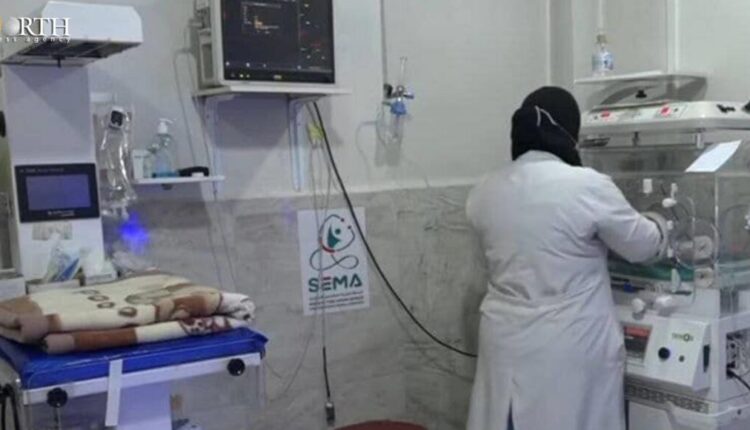
ALEPPO, Syria (North Press) – Muhammad Balorg, 31, needs more than 300.000 Syrian pounds (SYP – about $44) per month to cover his nine-month-old baby’s needs.
Balorg, a government employee who works in the Directorate of Agriculture in Aleppo, said that his monthly salary only covers his baby needs for two weeks.
Securing 300.000 SYP per month is exhausting in Syria, a failing state with a collapsing economy, where the income of many employees does not exceed $15 a month.
The child’s expenses, according to Balorg, are now beyond his reach. He added, “If I did not work as a taxi driver after my full-time job, my wife and I would have starved.”
For many families, having a baby today is a burden. “The adults can bear the hunger, but the infant cannot,” said Balorg.
They young father works as an employee from 8:00 am to 3:00 pm and moonlights as a taxi driver until one o’clock in the morning. “Only this way I can afford to buy one can of powdered milk and a bag of diapers for my kid”.
“One can of baby formula is sold at 30.000 SYP (about $4). Sometimes I have to pay 35.000 SYP (about $5) or more because it is not available all the time. The price of a bag of diapers is 27.000 SYP ($4),” the father said.
“Every two days, I buy a can of baby formula and a bag of diapers, meaning that my monthly salary covers my child’s need only for one week,” he told North Press.
Every new married couple is now thinking twice before making the decision of bringing a child into this world.
“This child is a gift, we have been waiting for him impatiently for four years, but we were overwhelmed by the expenses. A new child means another mouth to feed, an additional financial burden that most families may not be able to afford,” the father said sadly.
37-year-old Ziad Toubal and his wife agreed not to have children because of the dire economic conditions.
The young man and his wife postponed childbearing, especially due to the high costs of pregnancy and childbirth that the couple is unable to afford.
“The decision to delay having a child, which my wife and I took, is a painful one. Everyone gets married to form their own family, but with these difficult circumstances, it is difficult for us to bring in a child to this miserable life,” Toubal told North Press.
“Governments usually take care of newborns from the moment of pregnancy to an advanced age, but here we must pay and bear huge financial burdens that exceed our ability, from the moment of announcing pregnancy, through childbirth, to the stage of raising children,” Toubal added.
“I cannot have a baby at the moment, I work in a sewing workshop and hardly provide the basics living needs for my wife,” the desperate young man said.
Both white-collar and blue-collar workers cannot maintain their daily needs with one shift. Nearly everyone works multiple jobs.
“Most of the time I work an extra shift so that I can cover even a small part of the costs of my daily life,” he concluded.
Dr. Maha Abdurrahman, 47, a gynecologist in the al-Akramiyah neighborhood in Aleppo, told North Press that “most of the women who come to my clinic ask for contraceptive methods. Most of them for the same reason, which is the inability to afford the expenses of a new child.”
“This trend is increasing dramatically in Aleppo. Seeking birth control is not limited to families with children but also with the newly-wedded couples,” the doctor added.
The decision to delay childbearing is contrary to social norms, as the desire to have a baby is great, especially for young couples.
The minimum cost of a caesarean surgery is 2 million SYP ($297), and a natural birth is 1.200.000 SYP ($178). Of course, the price may rise to more than that, depending on the hospital and the medical care provided, and of course this is what many cannot afford, according to the doctor.
“Unless the government implements a special policy that guarantees healthy and balanced nutritional and health care conditions for newborns, this phenomenon threatens to upend the existing structure of society,” the doctor concluded.
